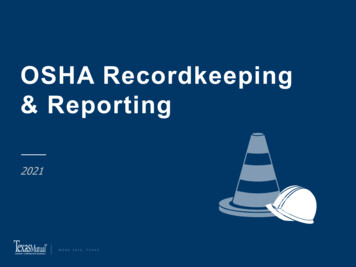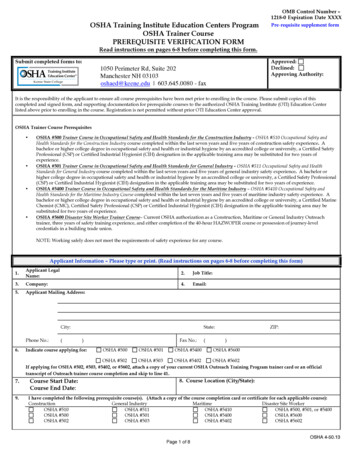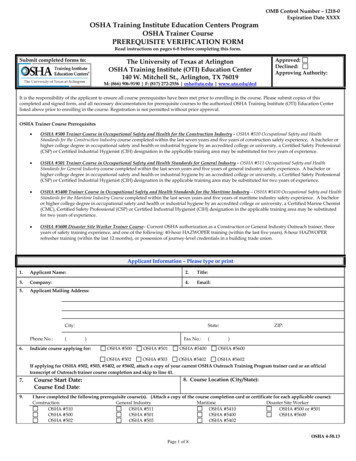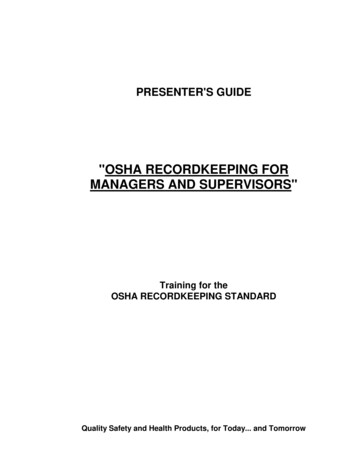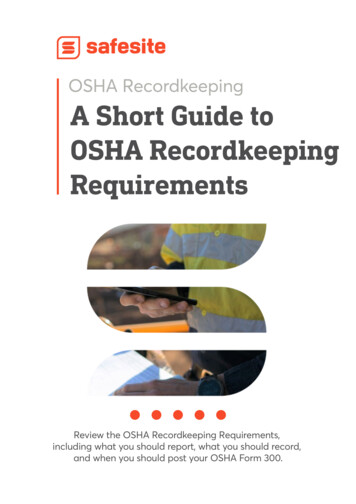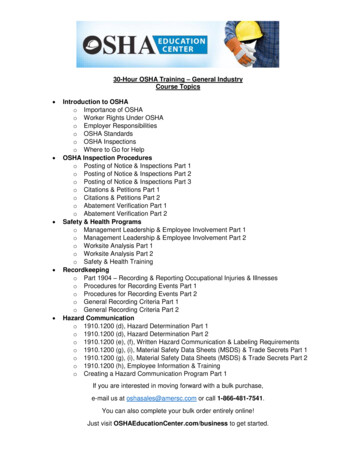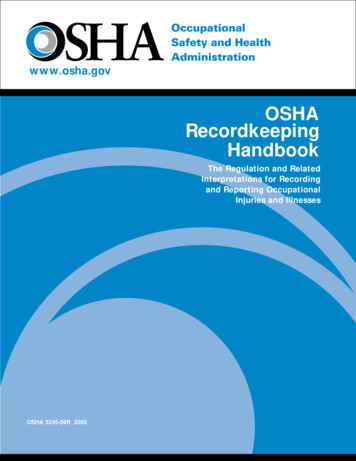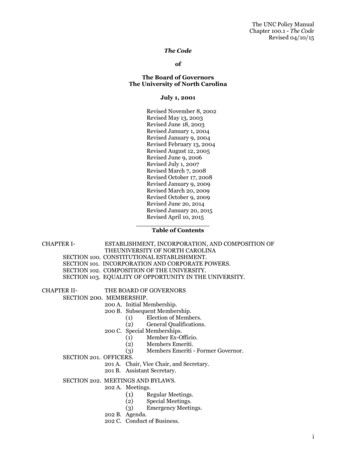
Transcription
January 24-25, 2017OSHA’s RevisedRecordkeeping Rule, andPost-Incident Drug Test IssueCamille Villanova202-255-6194cvsafety@hotmail.com
January 24-25, 2017Overview OSHA RecordkeepingStandards, Policies, Drug TestingOSHA Recordkeeping Revisions Revisions Revisions Camille Villanova cvsafety@hotmail.com
Hierarchy: Laws, Regulations, Standards, PolicyLaw, 91-596, OSH Act ( in the United States Code)Standards/RegulationsPolicy: Instruction/Notice(CPL 02-00-159 Effective Date: October 1,2015, Subject: Field Operations Manual (FOM))Letters of Interpretation,Memorandums, Guidance,
Occupational Safety and Health ActPublic Law 91-59684 STAT. 159091st Congress, S.2193December 29, 197029 United States Code 651
Recordkeeping2 Sections of theOccupational Safety and Health ActSection 8 Inspections, Investigations,and RecordkeepingSection 24 Statistics
OSH Act Section 8 Inspections, Investigations, and Recordkeeping(c)(1) EachDec 29, 1970employer shall make, keep andpreserve, and make available to theSecretary or the Secretary of Health andHuman Services, such records regardinghis activities relating to this Act , mayprescribe by regulation as necessary orappropriate for the enforcement of thisAct or for developing informationregarding the causes and prevention ofoccupational accidents and illnesses
OSH Act Section 8 Inspections, Investigations, and RecordkeepingDec 29, 197029 CFR 1904 is a regulation
OSH Act Section 8 Inspections, Investigations, and Recordkeeping(c)(1) Dec 29, 1970The Secretary shall also issue regulationsrequiring that employers, through postingof notices or other appropriate means,keep their employees informed of theirprotections and obligations under this Act,including the provisions of applicablestandards
OSH Act Section 24 Statistics(a) InDec 29, 1970order to further the purposes of this Act,the Secretary, in consultation with theSecretary of Health and Human Services,shall develop and maintain an effectiveprogram of collection, compilation, andanalysis of occupational safety and healthstatistics.
OSH Act Section 24 StatisticsDec 29, 1970(a) The Secretary shall compileaccurate statistics on work injuries andillnesses which shall include alldisabling, serious, or significant injuries andillnesses, whether or not involving loss of timefrom work, other than minor injuries requiringonly first aid treatment and which do notinvolve medical treatment, loss ofconsciousness, restriction of work or motion, ortransfer to another job.
OSH Act Section 24 StatisticsDec 29, 1970(e) On the basis of the records made andkept pursuant to section 8(c) of this Act,employers shallfile such reports with the Secretaryas he shall prescribe by regulation,as necessary to carry out his functionsunder this Act
29 CFR 1904Subpart CRecordkeeping Forms andRecording Criteria36 FR 12612 July 2 1971
29 CFR 1904January 19, 2001Effective January 1, 2002Standard is written inQuestion and Answer Format
NPRM Notice of Public Rule Making2015 Fall Semi-annual Regulatory AgendaStakeholder MeetingsNPRMNPRM Comment Period EndNotice of Public Meeting on01/09/2013NPRM Comment PeriodExtendedNPRM Comment PeriodExtended EndNPRM Comment PeriodReopenedNPRM Comment PeriodReopened EndFinal Rule05/25/201011/08/201302/06/201475 FR 2450578 FR 6725411/15/201378 FR 6878201/07/201479 FR 77803/08/201408/14/201410/14/201403/00/201679 FR 47605
15From January 19, 2001toMay 20, 2016
Improve Tracking of Workplace Injuries andIllness Clarification of Employer'sContinuing Obligation To Make and Maintainan Accurate Record of Each RecordableInjury and IllnessOccupational Injury and Illness Recordingand Reporting RequirementsModernization of OSHA’s Injury and IllnessData Collection ProcessSupplemental Notice Of ProposedRulemaking
Federal Register Vol. 81, No. 92 May 12, 2016Occupational Safety and Health Administration29 CFR Parts 1904 and 1902[Docket No. OSHA–2013–0023]RIN 1218–AC49Improve Tracking of WorkplaceInjuries and IllnessesAGENCY: Occupational Safety and HealthAdministration (OSHA), Labor.ACTION: Final RuleEffective on January 1, 2017,Except 1904.35 and 1904.36, whichbecome effective on August 10, 2016
Federal Register Vol. 81, No. 98May 20, 2016ACTION: Final Rule; CORRECTIONOccupational Safety and Health Administration29 CFR Parts 1902; 1904[Docket No. OSHA–2013–0023]RIN 1218–AC49Improve Tracking of Workplace Injuriesand IllnessesAGENCY: Occupational Safety and HealthAdministration (OSHA), Labor.
Federal Register Vol. 81, No. 98 May 20, 2016ACTION: Final Rule; CorrectionEffective August 10, 2016Need for CorrectionInadvertently 1904.35(b)(2)Was designated as reserved.This document reinserts that paragraph
Federal Register Vol. 81, No. 98 May 20, 2016ACTION: Final Rule; correction.SUMMARY: . In the rule, a paragraph was inadvertently removed. This document1904.35(b)(2) Do I have to give my employees and their representativesreinserts that paragraph.access to the OSHA injury and illness records? Yes, your employees,former employees, their personal representatives, and their authorizedemployee representatives have the right to access the OSHA injury andillness records, with some limitations, as discussed below.(i) Who is an authorized employee representative? An authorizedemployee representative is an authorized collective bargaining agent ofemployees.(ii) Who is a "personal representative" of an employee or formeremployee? A personal representative is:(A) Any person that the employee or former employee designates assuch, in writing; or(B) The legal representative of a deceased or legally incapacitatedemployee or former employee.(iii) If an employee or representative asks for access to the OSHA300 Log, when do I have to provide it? When an employee, formeremployee, personal representative, or authorized employeerepresentative asks for copies of your current or stored OSHA 300Log(s) for an establishment the employee or former employee has workedin, you must give the requester a copy of the relevant OSHA 300 Log(s)by the end of the next business day.(iv) May I remove the names of the employees or any otherinformation from the OSHA 300 Log before I give copies to an employee,former employee, or employee representative? No, you must leave thenames on the 300 Log. However to protect the privacy of injured andill employees, you may not record the employee's name on the OSHA 300Log for certain "privacy concern cases," as specified in Sec.1904.29(b)(6) through (9).(v) If an employee or representative asks for access to the OSHA301 Incident Report, when do I have to provide it? (A) When anemployee, former employee, or personal representative asks for a copyof the OSHA 301 Incident Report describing an injury or illness to thatemployee or former employee, you must give the requester a copy of theOSHA 301 Incident Report containing that information by the end of thenext business day.(B) When an authorized employee representative asks for copies ofthe OSHA 301 Incident Reports for an establishment where the agentrepresents employees under a collective bargaining agreement, you mustgive copies of those forms to the authorized employee representativewithin 7 calendar days. You are only required to give the authorizedemployee representative information from the OSHA 301 Incident Reportsectiontitled "Tell us about the case." You must remove all otherinformation from the copy of the OSHA 301 Incident Report or theequivalent substitute form that you give to the authorized employeerepresentative.(vi) May I charge for the copies? No, you may not charge for thesecopies the first time they are provided. However, if one of thedesignated persons asks for additional copies, you may assess areasonable charge for retrieving and copying the records."
Federal Register Vol. 81, No. 98 May 20, 2016ACTION: Final Rule; Correction1904.35(b)(2) Do I have to give my employeesand their representativesaccess to the OSHA injury and illnessrecords?Yes, your employees, former employees, theirpersonal representatives, andtheir authorized employee representativeshave the right to access the OSHA injury andillness records, with some limitations,
Federal Register Vol. 81, No. 243 December 19, 2016ACTION: Final Rule;Clarification of Employer's ContinuingObligation To Make and Maintain anAccurate Record of Each RecordableInjury and IllnessEffective January 18, 2017Revised Sections1904.0, 4, 29, 32, 33, 34, 35, 40
Federal Register Vol. 81, No. 243 December 19, 2016ACTION: Final Rule; Clarification of Employer's Continuing Obligation To Makeand Maintain an Accurate Record of Each Recordable Injury and IllnessEffective January 18, 2017REVISED1904.0 Purpose.1904.4 Recording criteria.1904.29(b)(3) Forms1904.32 Year-end review and annual summary1904.33 Retention and maintenance of accuraterecords1904.34 Change in business ownership.1904.35 Employee involvement.1904.40 Providing accurate records togovernment representatives
Federal Register Vol. 81, No. 243 Dec. 19, 2016ACTION: Final Rule;Clarification of Employer's Continuing ObligationTo Make and Maintain an Accurate Record of EachRecordable Injury and IllnessEffective January 18, 2017Need to clarify that the duty to makeand maintain accurate records ofwork-related injuries and illnesses isan ongoing obligation
Federal Register Vol. 81, No. 243 December 19, 2016ACTION: Final Rule; Clarification of Employer's Continuing Obligation To Makeand Maintain an Accurate Record of Each Recordable Injury and IllnessEffective January 18, 2017REVISEDPrior1904.0 The purpose of this rule (part1904.0 Purpose1904) is to require employers to makeThe purpose of this and maintain accurate records of andrule (Part 1904) is report work-related fatalities, injuries, andillnesses, and to make such recordsto requireavailable to the Government and toemployers to record employees and their representatives soand report workthat they can be used to secure safe andrelated fatalities,healthful working conditions. Forpurposes of this part, accurate recordsinjuries andare records of each and every recordableillnesses.injury and illness that are made andmaintained in accordance with therequirements of this part.
Federal Register Vol. 81, No. 243 December 19, 2016ACTION: Final Rule; Clarification of Employer's Continuing Obligation To Makeand Maintain an Accurate Record of Each Recordable Injury and IllnessEffective January 18, 2017REVISED1904.0 The purpose of this rule (part 1904) is to requireemployers to make and maintain accurate records ofand report work-related fatalities, injuries, and illnesses,and to make such records available to the Governmentand to employees and their representatives so that theycan be used to secure safe and healthful workingconditions. For purposes of this part, accurate recordsare records of each and every recordable injury andillness that are made and maintained inaccordance with the requirements of this part.
29 CFR 1904.4 (2001)(a) Basic requirement.Each employer requiredby this part to keeprecords of fatalities,injuries, and illnessesmust record each fatality,injury, and illness that:(1) Is work-related; and(2) Is a new case; and(3) Meets one or more of thegeneral recording criteria of§1904.7 or the application tospecific cases of §1904.8through §1904.12Federal Register Vol. 81, No.243 December 19, 2016(a) Basic requirement.Each employer requiredby this part to keeprecords of fatalities,injuries, and illnessesmust, in accordance withthe requirements of thispart, make and maintainan accurate record ofeach and every fatality,injury, and illness that:
Federal Register Vol. 81, No. 243 December 19, 2016ACTION: Final Rule1904.35(b)(2) Do I have to give my employeesand their representativesaccess to the OSHA injury and illnessrecords?Yes, your employees, former employees, theirpersonal representatives, andtheir authorized employee representativeshave the right to access accurate OSHA injuryand illness records, with some limitations, asdiscussed below.
Federal Register Vol. 79, No. 157 /Thursday,August 14, 2014Supplemental Notice of Proposed RulemakingImprove Tracking of Workplace Injuries and IllnessesOf the 18 questions 5 main questions addressAdverse action or disciplinethat may discourage an employeefrom reporting and injury or illnessIn this group is the mention ofdrug testing
Federal Register Vol. 79, No. 157 /Thursday, August 14, 2014 Proposed RulesImprove Tracking of Workplace Injuries and IllnessesThe drug testing discussion lead-in is:Adverse actions mentioned byparticipants in the public meeting(January 09–10, 2014)included requiring employeeswho reported an injury to undergodrug testing where there was noreason to suspect drug use,
Federal Register Vol. 79, No. 157 /Thursday, August 14, 2014 Proposed RulesImprove Tracking of Workplace Injuries and IllnessesA question in this "adverse action" group is:Are you aware of employer practices orpolicies to take adverse action againstpersons who report injuries or illnesses?Please describe them?
Federal Register Vol. 79, No. 157 /Thursday, August 14, 2014 Proposed RulesImprove Tracking of Workplace Injuries and IllnessesA question in this "adverse action" group is:Are you aware of any particular situationswhere an employee decided not to report aninjury or illness to his or her employerbecause of a fear that the employer wouldtake adverse action against the employee?If so, please describe the situation, includingthe nature of the injury or illness and thereasons the employee had for believing he orshe would be retaliated against.
Federal Register Vol. 79, No. 157 /Thursday, August 14, 2014 Proposed RulesImprove Tracking of Workplace Injuries and IllnessesA question in this "adverse action" group is:What kinds of adverse actions mightlead an employee to decide not toreport an injury or illness?Are there other employer actions thatwould not dissuade a reasonableemployeefrom reporting an injury or illness?
Federal Register Vol. 79, No. 157 /Thursday, August 14, 2014 Proposed RulesImprove Tracking of Workplace Injuries and IllnessesA question in this "adverse action" group is:OSHA encourages employers toenforce safety rules as part of awell-functioning workplace safety program.Are there any employer practices thatOSHA should explicitly exclude under thisprovision to ensure that employers are ableto run an effective workplace safetyprogram?
Federal Register Vol. 79, No. 157 /Thursday, August 14, 2014 Proposed RulesImprove Tracking of Workplace Injuries and IllnessesA question in this "adverse action" group is:OSHA encourages employers to enforcesafety rules as part of a well-functioningworkplace safety program.Are there any employer practices thatOSHA should explicitly exclude underthis provision to ensure that employersare able to run an effective workplacesafety program?
Federal Register Vol. 79, No. 157 /Thursday, August 14, 2014 Proposed RulesImprove Tracking of Workplace Injuries and IllnessesA question in this "adverse action" group is:What other actions can OSHA take toaddress the issue of employers whodiscourage employees from reportinginjuries and illnesses?
Federal Register Vol. 81, No. 92 May 12, 2016Final RuleEffective on January 1, 2017, Except 1904.35 and 1904.36,which become effective on August 10, 2016 Preamble p 29672:OSHA received a number of commentsexpressing concern that this section of thefinal rule will have a chilling effect onemployers disciplining employees whoviolate safety rules, thereby contributing to aless safe work environment. It is importantto note that the final rule prohibitsemployers only from taking adverse actionagainst an employee because the employeereported an injury or illness.
Federal Register Vol. 81, No. 92 May 12, 2016Final RuleEffective on January 1, 2017, Except 1904.35 and 1904.36, which become effectiveon August 10, 2016Preamble p 29672:It is important to note that the final rule prohibitsemployers only from taking adverse action against anemployee because the employee reported an injury orillness. Nothing in the final rule prohibitsemployers from disciplining employees forviolating legitimate safety rules, even if the sameemployee who violated a safety rule also wasinjured as a result of that violation and reportedthat injury or illness (provided that employeeswho violate the same work rule are treatedsimilarly without regard to whether they alsoreported a work-related illness or injury).
Federal Register Vol. 81, No. 92 May 12, 2016 Final RuleEffective on January 1, 2017, Except 1904.35 and 1904.36, which becomeeffective on August 10, 2016 Preamble p 29672:. Nothingin the final rule prohibitsemployers from discipliningemployees for violating legitimatesafety rules, even if the same employee whoviolated a safety rule also was injured as a result ofthat violation and reported that injury or illness(provided that employees who violate the samework rule are treated similarly without regard towhether they also reported a work-relatedillness or injury)
Federal Register Vol. 81, No. 92 May 12, 2016 Final RuleEffective on January 1, 2017, Except 1904.35 and 1904.36, which becomePreamble p 29672:effective on August 10, 2016. Nothing in the final rule prohibits employersfrom disciplining employees for violatinglegitimate safety rules, even if the sameemployee who violated a safety rule also wasinjured as a result of that violation and reportedthat injury or illness(provided that employees who violate thesame work rule are treated similarlywithout regard to whether they alsoreported a work-related illness or injury)
Federal Register Vol. 81, No. 92 May 12, 2016, Final RulePreamble pp 29672-3:Commenter's also pointed to policiesmandating automatic post-injury drug testingas a form of adverse action that candiscourage reporting. See, Exs 1675,1695.Although drug testing of employees may be areasonable workplace policy in somesituations, it is often perceived as an invasionof privacy, so if an injury or illness is very unlikely to havebeen caused by employee drug use, or if the method of drugtesting does not identify impairment but only use at some timein the recent past, requiring the employee to be drug testedmay inappropriately deter reporting.
Federal Register Vol. 81, No. 92 May 12, 2016, Final RulePreamble pp 29672-3:Commenter's also pointed to policies mandating automatic post-injury drugtesting as a form of adverse action that can discourage reporting. See,e.g., Exs. 1675, 1695. Although drug testing of employees may be areasonable workplace policy in some situations, it is often perceived as anso if an injury or illnessis very unlikely to have been caused byemployee drug use, or if the method ofdrug testing does not identify impairmentbut only use at some time in the recentpast, requiringthe employee to be drug tested mayinappropriately deter reporting invasion of privacy,
Federal Register Vol. 81, No. 92 May 12, 2016, Final RulePreamble pp 29672-3: so if an injury or illnessis very unlikely to have been causedby employee drug use,or if the method of drug testing doesnot identify impairmentbut only use at some time in therecent past,requiring the employee to be drugtested may inappropriately deterreporting
Federal Register Vol. 81, No. 92 May 12, 2016, Final RulePreamble p 29673:Some commenter's stated theirbelief that drug testing of employeesis important for a safe workplace;
Comment: https://www.regulations.gov/document?D OSHA-2013-0023-1603MCAA Post-accident drug testing is a critical partof any satisfactory company safety andhealth program. purpose of protecting all workers on thejobsite, not just the would-be users.[sic Also], being found under the influence ofa drug following post-accident testing isoften all it takes to prompt an affectedemployee to seek help through an employeeassistance program or some other source
Federal Register Vol. 81, No. 92 May 12, 2016, Final RulePreamble p 29673:some [sic Commenter's]expressed concern that OSHAplanned a wholesale banon drug testing (Exs. 1667, 1674)
Federal Register Vol. 81, No. 92 May 12, 2016, Final RulePreamble p 29673:To the contrary, this final ruledoes not ban drug testing ofemployees
Federal Register Vol. 81, No. 92 May 12, 2016, Final RulePreamble p 29673:OSHA believes theevidence in the rulemakingrecord shows thatblanket post-injurydrug testing policies deterproper reporting
Federal Register Vol. 81, No. 92 May 12, 2016, Final RulePreamble p 29673: thisfinal ruledoes not ban drug testing ofemployees
Federal Register Vol. 81, No. 92 May 12, 2016, Final RulePreamble p 29673:However, the final ruledoes prohibit employers fromusing drug testing(or the threat of drug testing)as a form of adverse actionagainst employeeswho report injuries or illnesses
Federal Register Vol. 81, No. 92 May 12, 2016, Final RulePreamble p 29673:Employers need not specificallysuspect drug use before testing,but there should be areasonable possibility that drug useby the reporting employeewas a contributing factorto the reported injury or illnessin orderfor an employer to require drug testing
Letter of Interpretation August 23, .show document?p table INTERPRETATIONS&p id 31061 An employee was operating a poweredindustrial truck (a "walkie"). Her footbecame jammed between the walkie anda pallet and her steel toed shoe bent andcut the top of her toe. She received fourstitches for the laceration.At the time of the incident, the employeewas taking prescription medication for anon-work related condition
Letter of Interpretation August 23, .show document?p table INTERPRETATIONS&p id 31061 Section 1904.5(a) states,[the employer] must consider aninjury or illness to bework-relatedif an event or exposurein the work environmenteither caused or contributedto the resulting condition
Letter of Interpretation August 23, 2016https://www.osha.gov/pls/oshaweb/owadisp.show document?p table INTERPRETATIONS&p id 31061 The injury described inyour scenario resulted fromoperation of workplaceequipment. POLICY
Letter of Interpretation August 23, 2016https://www.osha.gov/pls/oshaweb/owadisp.show document?p table INTERPRETATIONS&p id 31061POLICY Under Section 1904.5(b)(2)(ii), anevent or exposure in the workenvironment can play no part in theinjury. The facts of your scenariodo not meet this exceptionbecause the injury describedresulted from operation ofworkplace equipment
Letter of Interpretation August 23, .show document?p table INTERPRETATIONS&p id 31061 the exemption to work relatednessunder Section 1904.5(b)(2)(vi)would not apply for the same reason.Under Section 1904.5(b)(2)(vi) you arenot required to record an injury orillness if the injury or illness is solely theresult of self-medication for anon-work-related condition [sic HAS TO BE RECORDED]
Letter of Interpretation August 23, .show document?p table INTERPRETATIONS&p id 31061At the time of the incident, theemployee was taking prescriptionmedication for a non-work relatedcondition HAS TO BE RECORDED
29 CFR 1904 January 19, 2001 Effective Jan 1, 20021904.5(b)(2) Exceptions to 'Work-Related'Are there situations where an injury orillness occurs in the work environmentand is not considered work-related?Yes, an injury or illness occurring in thework environment that falls under one ofthe following exceptions is not workrelated, and therefore is not recordable.
29 CFR 1904 January 19, 2001 Effective Jan 1, 20021904.5(b)(2) From 9 Exceptions to 'Work-Related'(ii) The injury or illness involvessigns or symptoms that surface at work butresult solely from a non-work-related event orexposure that occurs outside the workenvironment.(vi) The injury or illness is solely the result ofpersonal grooming,self medication for a non-work-related condition,or is intentionally self-inflicted.
POLICY his hand was caught between twoobjects. After receiving treatmentfor the injury, the employee wasimmediately given apost-accident drug test.The results of the drug testindicated the employee wasintoxicated from alcohol Letter of Interpretation March 21, 2016https://www.osha.gov/pls/oshaweb/owadisp.show document?p table INTERPRETATIONS&p id 30545
POLICY OSHA's Office of OccupationalMedicine and Nursing concluded thatthe intake of alcohol does not treat thedisorder of alcoholism. Instead, drinkingalcohol is a manifestation of thedisorder. Accordingly, the injurydescribed in the scenario abovedoes not meet the exception in Section1904.5(b)(2)(vi) for self-medication.Letter of Interpretation March 21, 2016https://www.osha.gov/pls/oshaweb/owadisp.show document?p table INTERPRETATIONS&p id 30545
POLICY drinking alcohol is a manifestationof the disorder. Accordingly, theinjury described in the scenarioabove does not meet the exception[sic for work related]in 1904.5(b)(2)(vi) forself-medication.Has to Be RecordedLetter of Interpretation March 21, 2016https://www.osha.gov/pls/oshaweb/owadisp.show document?p table INTERPRETATIONS&p id 30545
POLICY278Letters of Interpretation fromOctober 29, 2001 toSeptember 12, 2016
Federal Register Vol. 81, No. 92 May 12, 2016, Final Rule From Preamble p 29673: commenter's also raised the concern that thefinal rule will conflict with drug testingrequirements contained inworkers' compensation laws If an employer conducts drug testing to complywith the requirements of a state or federal lawor regulation, the employer's motivewould not be retaliatory and the final rule wouldnot prohibit such testing Section 4(b)(4) of the Act prohibits OSHA fromsuperseding or affectingworkers' compensation laws
Federal Register Vol. 81, No. 92 May 12, 2016, Final Rule From Preamble p 29673:If an employer conducts drug testingto comply with the requirements of astate or federal law or regulation, theemployer's motive would not beretaliatory and the final rule would notprohibit such testing Section 4(b)(4) of the Act prohibitsOSHA from superseding or affectingworkers' compensation laws
Federal Register Vol. 81, No. 92 May 12, 2016, Final RulePreamble p 29673:However, the final ruledoes prohibit employersfrom using drug testing(or the threat of drug testing)as a form of adverse actionagainst employeeswho report injuries or illnesses
Occupational Safety and Health ActDecember 29, 1970Section 11 Judicial ReviewParagraph (c)11c
Occupational Safety and Health ActDecember 29, 1970SEC. 11c Judicial Review(c) (1) No person shall discharge orin any manner discriminate against anyemployee because such employee hasfiled any complaint or instituted or caused tobe instituted any proceeding under or relatedto this Actor has testified or is about to testify in anysuch proceeding or because of the exercise bysuch employee on behalf of himself or othersof any right afforded by this Act
Occupational Safety and Health ActDecember 29, 1970SEC. 11c Judicial Review(2) Any employee who believes that he has been dischargedor otherwise discriminated against by any person in violationof this subsection may, within thirty days after such violationoccurs, file a complaint with the Secretary alleging suchdiscrimination. Upon receipt of such complaint, the Secretaryshall cause such investigation to be made as he deemsappropriate. If upon such investigation, the Secretarydetermines that the provisions of this subsection have beenviolated, he shall bring an action in any appropriate UnitedStates district court against such person. In any such actionthe United States district courts shall have jurisdiction, forcause shown to restrain violations of paragraph (1) of thissubsection and order all appropriate relief including rehiring orreinstatement of the employee to his former position with backpay.
Occupational Safety and Health ActSEC. 11c Judicial ReviewDecember 29, 1970(2) Any employee who believes that hehas been discharged or otherwisediscriminated against by any person inviolation of this subsection may, withinthirty days after such violation occurs, filea complaint with the Secretary allegingsuch discrimination. Upon receipt of suchcomplaint, the Secretary shall causesuch investigation to be made as hedeems appropriate.
January 2001 1904.36Prohibition againstdiscrimination.Section 11(c) of the Actprohibits you fromdiscriminating against anemployee for reporting awork-related fatality, injuryor illness. That provision ofthe Act also protects theemployee who files a safetyand health complaint, asksfor access to the Part 1904records, or otherwiseexercises any rightsafforded by the OSH Act.May 12, 2016 1904.36Prohibition againstdiscrimination.In addition to §1904.35,section 11(c) of the OSH Actalso prohibits you fromdiscriminating against anemployee for reporting awork-related fatality, injury,or illness. That provision ofthe Act also protects theemployee who files a safetyand health complaint, asksfor access to the part 1904records, or otherwiseexercises any rights affordedby the OSH Act.
Employee Involvement2001 1904.35(a) Basic requirement. Youremployees and theirrepresentativesmust be involved in therecordkeeping system inseveral ways.May 12, 2016 1904.35(a) Basic requirement. Youremployees and theirrepresentativesmust be involved in therecordkeeping system inseveral ways.(a)(1) You must inform eachemployee of how he or sheis to report an injury orillness to you.(a)(1) You must inform eachemployee of how he or she isto report a work-related injuryor illness to you.(a)(2)You must providelimited access to your injuryand illness records for youremployees and theirrepresentatives.(a)(2) You must provideemployees with theinformation described inparagrap
OSHA's Revised Recordkeeping Rule, and Post-Incident Drug Test Issue Camille Villanova 202-255-6194 cvsafety@hotmail.com . January 24-25, 2017 Camille Villanova cvsafety@hotmail.com Overview OSHA Recordkeeping Standards, Policies, Drug Testing OSHA Recordkeeping Revisions
